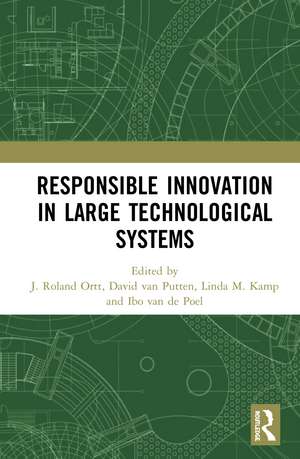Responsible Innovation in Large Technological Systems
Editat de J. Roland Ortt, David van Putten, Linda M. Kamp, Ibo van de Poelen Limba Engleză Hardback – 12 mar 2020
This book defines responsible innovation and describes how both the innovation process and the resulting innovation outcome can be designed, created and implemented in a way that respects the various stakeholder groups involved and affected by the system. Taking a case-based approach, a number of large technological systems are profiled, including hydraulic engineering, nuclear energy, smart metering, and wind power. The values of each of the stakeholder groups, and the costs and benefits of the systems presented, are analysed. The book concludes by combining these insights to provide a framework for how responsible innovation of large technological systems can be implemented in practice.
The book will be of particular interest to undergraduate and postgraduate students and researchers in technology and innovation management, and corporate governance, CSR and business ethics.
Preț: 763.62 lei
Preț vechi: 1027.07 lei
-26% Nou
Puncte Express: 1145
Preț estimativ în valută:
146.12€ • 152.26$ • 120.99£
146.12€ • 152.26$ • 120.99£
Carte tipărită la comandă
Livrare economică 03-17 aprilie
Preluare comenzi: 021 569.72.76
Specificații
ISBN-13: 9780367895815
ISBN-10: 0367895811
Pagini: 198
Ilustrații: 16 Tables, black and white; 11 Line drawings, black and white; 6 Halftones, black and white
Dimensiuni: 156 x 234 x 14 mm
Greutate: 0.41 kg
Ediția:1
Editura: Taylor & Francis
Colecția Routledge
Locul publicării:Oxford, United Kingdom
ISBN-10: 0367895811
Pagini: 198
Ilustrații: 16 Tables, black and white; 11 Line drawings, black and white; 6 Halftones, black and white
Dimensiuni: 156 x 234 x 14 mm
Greutate: 0.41 kg
Ediția:1
Editura: Taylor & Francis
Colecția Routledge
Locul publicării:Oxford, United Kingdom
Public țintă
Postgraduate, Professional, and Undergraduate AdvancedCuprins
- Introduction: Exploring responsible innovation of large technological systems in societyJ.R. Ortt, I.R. van de Poel, D.C. van Putten, L.M. Kamp
- Responsible innovation in the hydraulic engineering sectorP.H.A.J.M. van Gelder, N. Doorn, J.G. de Gijt
- Responsible innovation for smart metering: An illustrative case studyG. van de Kaa, P.M. Herder, A. Ligtvoet, Z. Lukszo
- Frames of reference and the interpretation of values in the Dutch shale gas debateM. Dignum, U. Pesch, A.F. Correljé
- Responsible innovation of nuclear energy technologies: Social experiments, intergenerational justice, and emotionsB. Taebi, S. Roeser, I.R. van de Poel
- Can frugal innovations be responsible innovations?C.P. van Beers, P. Knorringa, A.H.M. Leliveld
- How responsible was innovation in subsequent wind power episodes?J.R. Ortt, L.M. Kamp, R.W. Kunneke
- Responsible port innovation in the Dutch delta: the Maasvlakte 2 port extension projectW. Ravesteijn
- How do we judge the responsibility (or otherwise) of research and innovation?
Capital, Aristotle, and the neglected factor: freedomC.W.M. Naastepad, J.M. Mulder - Conclusions: What is responsible innovation and how to do it?
Notă biografică
J. Roland Ortt is Associate Professor of Technology and Innovation Management at Delft University of Technology, the Netherlands.
David van Putten is a PhD student working at the Faculty of Philosophy (ESPhil) of the Erasmus University in Rotterdam, the Netherlands.
Linda M. Kamp is Assistant Professor of Sustainable Innovations and Transitions at Delft University of Technology, the Netherlands.
Ibo van de Poel is Anthoni van Leeuwenhoek Professor in Ethics and Technology and Head of the Department of Values, Technology and Innovation at the Faculty of Technology, Policy and Management at the Technical University Delft in the Netherlands.
David van Putten is a PhD student working at the Faculty of Philosophy (ESPhil) of the Erasmus University in Rotterdam, the Netherlands.
Linda M. Kamp is Assistant Professor of Sustainable Innovations and Transitions at Delft University of Technology, the Netherlands.
Ibo van de Poel is Anthoni van Leeuwenhoek Professor in Ethics and Technology and Head of the Department of Values, Technology and Innovation at the Faculty of Technology, Policy and Management at the Technical University Delft in the Netherlands.
Descriere
This book defines responsible innovation and describes how both the innovation process and the resulting innovation outcome can be designed, created and implemented in a way that respects the various stakeholder groups involved and affected by the large technological system, eg hydraulic engineering, nuclear energy, and wind power.




























